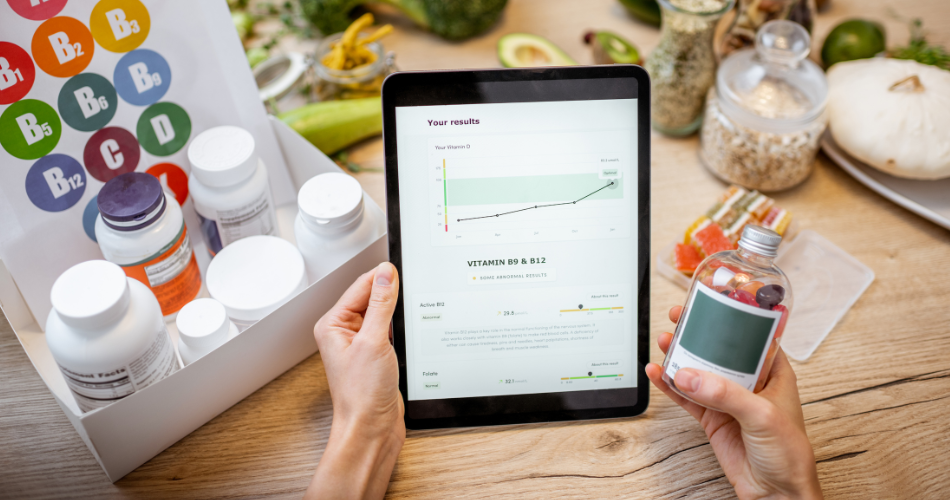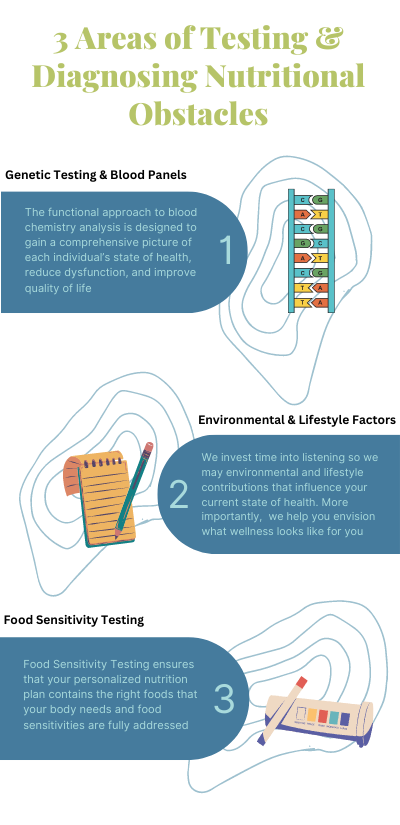Functional Testing

Test, Don’t Guess.
Know Your Numbers!
Real Food. Real People. Real Results.
We Combine Scientific Testing with Functional Testing
Our personalized treatment plans may include blood testing, food allergy and/or food sensitivity testing, meal planning, blood work, goal setting, supplement recommendations, or other modalities to assist you in achieving your goals. Learn more about our services below or call for a complimentary consultation!
Our Proven 3-Sided Approach to Testing
Innovative Nutrition invests time in listening and considering genetic, environmental, and lifestyle contributions that influence your current state of health. More importantly, we help you envision what wellness looks like for you. The next step is to develop a personalized nutrition plan to optimize your health and provide the tools and assistance to set yourself up for continued success.
1. Functional Blood Chemistry Analysis
The functional approach to blood chemistry analysis is designed to gain a comprehensive picture of each individual’s state of health, reduce dysfunction, and improve quality of life
2. Interviews and Education for Environmental Factors
We invest time into listening so we may environmental and lifestyle contributions that influence your current state of health. More importantly, we help you envision what wellness looks like for you
3. Functional Labs
Incorporating functional medicine tests empowers patients by uncovering underlying health imbalances that traditional methods might overlook. By pinpointing specific biomarkers and root causes, these tests enable personalized treatment plans tailored to each individual’s unique needs. Ultimately, this proactive approach can lead to more effective interventions and improved long-term health outcomes for patients.

Our 1-2-3 Approach To Nutritional Testing
1. Blood Panels
The functional approach to blood chemistry analysis is designed to gain a comprehensive picture of each individual’s state of health, reduce dysfunction, and improve quality of life.
Functional blood work analysis uses optimal lab ranges. Optimal lab ranges will be a narrower range in which the body functions most favorably. Traditional or “normal” reference ranges which are values in which 90-95% of the population falls within. Many of the people used to determine these so-called, “normal” values are in poor health. Therefore, values that fall within normal range may indicate the absence of disease but doesn’t necessarily correlate to good health. Optimal ranges may be more appropriate for those who are trying to proactively take control of their health and increase vitality.
Another important consideration is to look at lab values in correlation to each other. The interrelationship between biomarkers is far more valuable at assessing imbalances within a person’s physiology.
Normal doesn’t always mean optimal!
2. Interviews for Environmental & Lifestyle Factors
Testing for genetic factors and conducting blood panels tells only part of the story. It is important that we take the time to understand our client’s history, family history, environmental factors and other lifestyle factors that may be impacting our client’s nutritional health. Getting a full understanding of all the factors involved helps our nutritionists to educate our clients, work with them in a more practical way to adopt new healthy lifestyle strategies, and to develop a customized plan that WILL WORK! We believe that getting to know our clients and their unique circumstances is the key to connecting the scientific testing to the practical application of our customized nutrition plans.
3. Functional Labs
Combining traditional blood markers, symptom assessment, and lifestyle factors along with functional lab tests such as comprehensive stool analysis, hormone testing, and genetic testing provides a comprehensive view of your health. This holistic approach allows Innovative Nutrition to identify underlying imbalances at multiple levels, from biochemical to genetic, offering a more nuanced understanding of your condition and how to resolve the symptoms that are plaguing you. By integrating diverse sources of information, we are able to develop highly tailored treatment strategies that address the root causes of health issues, leading to more effective and sustainable outcomes.
Blood Panels
INNC Basic Panel
- Complete Blood Count (CBC) With Differential
- Comprehensive Metabolic Panel (CMP-14)
- Ferritin + Iron + Total Iron-binding Capacity (TIBC)
- Hemoglobin (Hb) A1c With eAG
- Lactic Acid Dehydrogenase (LD / LDH)
- Lipid Panel + VLDL + TC/HDL Ratio + LDL/HDL Ratio + CHD Risk
- Magnesium
- Phosphorus
- Thyroid-stimulating Hormone (TSH)
- Urinalysis, Complete With Microscopic Examination
- Vitamin D, 25-Hydroxy
- Insulin
- C-Reactive Protein (CRP), High Sensitivity
INNC Standard Panel
- Apolipoprotein B
- Bilirubin, Direct
- Complete Blood Count (CBC) With Differential
- Comprehensive Metabolic Panel (CMP-14)
- Cortisol
- C-Reactive Protein (CRP), High Sensitivity
- Dehydroepiandrosterone (DHEA) Sulfate
- Ferritin + Iron + Total Iron-binding Capacity (TIBC)
- Fibrinogen Activity (Factor I Activity)
- Gamma-Glutamyl Transferase (GGT)
- Hemoglobin (Hb) A1c With eAG
- Homocyst(e)ine
- Insulin
- Lactic Acid Dehydrogenase (LD / LDH)
- Lipid Panel + VLDL + TC/HDL Ratio + LDL/HDL Ratio + CHD Risk
- Lipoprotein(a)
- Magnesium
- Phosphorus
- Thyroid Profile II, Comprehensive; Tri-iodothyronine
- Uric Acid
- Urinalysis, Complete With Microscopic Examination
- Vitamin D, 25-Hydroxy
INNC Deluxe Panel
- Bilirubin, Direct
- Complete Blood Count (CBC) With Differential
- Comprehensive Metabolic Panel (CMP-14)
- Cortisol
- C-Reactive Protein (CRP), High Sensitivity
- Dehydroepiandrosterone (DHEA) Sulfate
- Ferritin + Iron + Total Iron-binding Capacity (TIBC)
- Fibrinogen Activity (Factor I Activity)
- Folate, RBC
- Gamma-Glutamyl Transferase (GGT)
- Glutathione, Total
- Hemoglobin (Hb) A1c With eAG
- Homocyst(e)ine
- Insulin
- Lactic Acid Dehydrogenase (LD / LDH)
- Lipid Panel + VLDL + TC/HDL Ratio + LDL/HDL Ratio + CHD Risk
- Magnesium
- Phosphorus
- Thyroid Profile II, Comprehensive; Tri-iodothyronine
- Uric Acid
- Urinalysis, Complete With Microscopic Examination
- Vitamin B12 (Cobalamin)
- Vitamin D, 25-Hydroxy
- Zinc, RBC
GI Map
- A comprehensive stool test designed to assess the microbiome and provide detailed insights to the presence and levels of gut bacteria, viruses, parasites, and fungi as well actionable insights to improve digestion, immune function, and inflammation.
DUTCH Hormone Panel + Cortisol
- In-depth hormone testing that provides insight on sex hormone levels the overall diurnal pattern of free cortisol, and the total distribution of cortisol metabolites in addition to OATs, which provide insight into nutritional deficiencies, oxidative stress, gut dysbiosis, melatonin, neuroinflammation, and more.
Diurnal Cortisol
- 4 measurements throughout the day to assess cortisol pattern and adrenal function.
Heavy Metals
- The Blood Metals Panel measures 16 different nutrient and toxic elements to assess toxic metal exposure and nutrient imbalances in whole blood.
- Heavy metal toxicity can lead to inflammation, disease or inability to lose weight
Genetic Testing
- DNA test kit that provides personalized diet, lifestyle, environmental, & disease prevention guidance to maximize long term health.
- 170 health reports including: Vitamin Requirements, Heavy Metal & Pesticide Sensitivity, Macronutrient Metabolism, Toxin Sensitivity, Bacteria, Yeast & Parasite Sensitivity, DNA Repair, Hormones & Fertility, Sleep Optimization, Meal Timing, Stress Management, Methylation, Cardiovascular Health, Mental Health including Anxiety, Addiction, Brain Repair & OCD, and Athletic Performance.
MRT Food Sensitivity Testing
- Mediated Release Food Sensitivity Test- MRT is the foundation of fully addressing food sensitivities and achieving the maximum outcomes in the shortest amount of time. Testing 170 foods and food chemicals not only does MRT give insight into inflammation-provoking foods and food chemicals, but more importantly MRT identifies your patient’s BEST foods – the foods that form the basis of their LEAP Eating Plan.
- Simply put, MRT gives you the information you can’t get any other way, and that information directly translates into targeted therapy that matters. MRT uses patented technology to measure food-induced inflammatory reactions. MRT is able to identify more relevant inflammatory reactions than any other test or method and quantifies the level of reactivity of each food or food chemical. which allows us to form the basis for the LEAP Eating Plan. MRT is the foundation of fully addressing food sensitivities and achieving the maximum outcomes in the shortest period of time.


